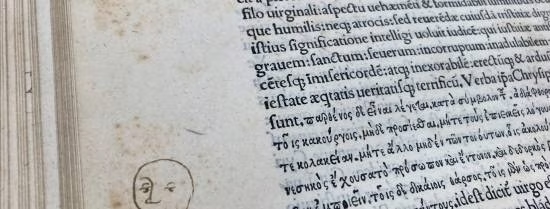The Erasmus of Rotterdam Research Centre (ERRC) regularly organizes the so-called Erasmus Seminars, where we bring together academics who have an interest in Erasmus from their research. The content of the seminars is diverse, from discussions on recent publications to extensive lectures. On behalf of the ERRC, we cordially invite you to the upcoming seminar on Tuesday, 21 January 15:00. During this meeting Jakub Łukaszewski will discuss the newly found items of the Erasmus collection of Jan Łaski in Polish libraries.
What? Erasmus Seminar with Jakub Łukaszewski
When? Tuesday, January 21, 15:00-17:00
Where? Online & Erasmus University Rotterdam, Langeveld 1.20
Zoom: https://eur-nl.zoom.us/j/65838851557
Abstract
In 1525, John à Lasco (Jan Łaski 1499–1560) purchased Erasmus of Rotterdam's book collection, but left the library for the humanist to use for life. After Erasmus' death (1536), the library was taken over and transported to Poland by Andrzej Frycz Modrzewski (ca1503–1572; a humanist and reformer) on Łaski's orders. As is well known, this collection of several hundred volumes was dispersed. To this day, several dozen books have been found and identified (see: A. Vanautgaerden, Ex bibliotheca Erasmi..., 2012). In Polish libraries, individual copies are known only in the collections of the Jagiellonian Library in Kraków. These include books purchased and taken over by Łaski (i.e. the so-called Erasmo–Lasciana), as well as author's copies, which Erasmus gave to important figures from the Polish royal court in the meantime. These examples will be briefly discussed.
The main goal of the paper will be to discuss the newly discovered and identified Erasmo–Lasciana in Polish libraries in recent years. These are two volumes (1 Sammelband and 1 single–item volume) identified in the University Library in Poznań and 1 volume from the University Library in Warsaw. They contain a total of 6 prints. The paper will be a case study of these three volumes. I will present their bibliographic description, presence on the so-called Versandliste, individual features of each of these copies: bindings, subsequent provenances (ownership marks), traces of use (readings), and further fate in the 16th-20th Cent.. It turns out that two volumes quickly ended up in the private libraries of Polish reformers and Protestants: Andrzej Frycz Modrzewski and Hieronim Filipowski (ca1530ca–1574). Then they were taken over by Roman Catholics: the Primate of Poland, Stanisław Karnkowski (1520–1603) and later by the Jesuit libraries in Poznań and Kalisz.
The volumes are a good example of the movement of books (and ideas) through the Europe. They are also a perfect example of the change of owners and their dispersion. Thanks to numerous traces of use, we can try to trace the functioning of these volumes in subsequent, changing contexts.
Bio
Jakub Łukaszewski – graduate of the Faculty of History, Adam Mickiewicz University, Poznań. He was a member of the team responsible for inventorying the book collection of the Gniezno Cathedral Library (2014–2016). Senior librarian in the Department of Old and Rare Books at the University Library in Poznań (2017–). His research interests focus on the history of the printed book: incunabula and 16th-century prints (early calendars and prognostic prints), study of reused materials in bookbindings (Fragmentology). For several years has been cooperating with the University Library in Uppsala on the digital reconstruction of the Library of the Jesuit College in Poznań, which were partially taken to Sweden as war booty in 1655–1656.

